Within the third level educational sector in Ireland, it is very common for universities and institutes of technology to employ multiple full time chaplains. Almost all of these bodies are entirely secular, without any religious involvement at all. However, there has been a tradition across this sector of awarding chaplaincy contracts to the local Roman Catholic bishop without advertisement or tender. In fact, it has been the case until recently that more than €1.5M per annum in State-funded contracts were handed over to the Roman Catholic Church in secret.
The campaign to reform this system has turned up a number of very informative documents. In order to facilitate ongoing accountability, the most pertinent documents are made available at the bottom of this page. This material may continue to be useful for tracking compliance. The need for such transparency is illustrated by the timeline for one example third level chaplaincy service, which is described below.
September 2015
During 2015, Atheist Ireland wrote to all third level educational institutions in the country about their publicly-funded chaplaincy services. It was argued that allowing a Roman Catholic bishop to appoint a priest to these roles, discriminated against both women and non-Catholics. Instead, a new approach was sought whereby public appointment guidelines would be adhered to, such that the positions would be advertised publicly then awarded to the best applicant for the job.
As one example of the problems that had existed, the Letterkenny Institute of Technology appointed their chaplaincy positions by first attempting a sectarian headcount of their catchment area. They decided that the three main denominations in that geography were the Roman Catholic Church, the Church of Ireland and the Presbyterian Church. On this basis, the institute awarded separate chaplaincy contract from public funds, to each of these three local denominations.
The awarding of State contracts by sectarian headcount is discriminatory in any event, but even their method of counting demonstrated prejudice against some beliefs. Specifically, there are more non-religious people in the relevant geography than those from the Church of Ireland and the Presbyterian Church combined. Notwithstanding this, the institute never considered appointing a non-religious chaplain and all potential non-religious applicants were excluded. These State-funded jobs were only available to Christians.
Even after all of these problems were explained in detail to the Letterkenny Institute of Technology, their response was to express full confidence in the discriminatory model that they had implemented. Here is Paul Hannigan, the President of Letterkenny Institute of Technology, responding in September 2015 to the detailed problems that had been highlighted with his appointment process for chaplains.
Mr Hannigan stated that he was “… very clear in terms of what we have done in the past. We have no issues with it and we are very happy and content …”.
October 2015
Atheist Ireland then continued their campaign by presenting the same arguments to the Joint Oireachtas Committee on Education, which in turn contacted the Department of Education. This resulted in the Higher Education Authority (HEA) undertaking an investigation into how much public money was being awarded to various religious denominations in chaplaincy contracts, and what process was being followed in making these awards.
The October 2015 letter depicted below is from the Secretary General of the Department of Education to the Clerk of the Joint Oireachtas Committee on Education. This is the correspondence in which the investigation by the HEA was announced.
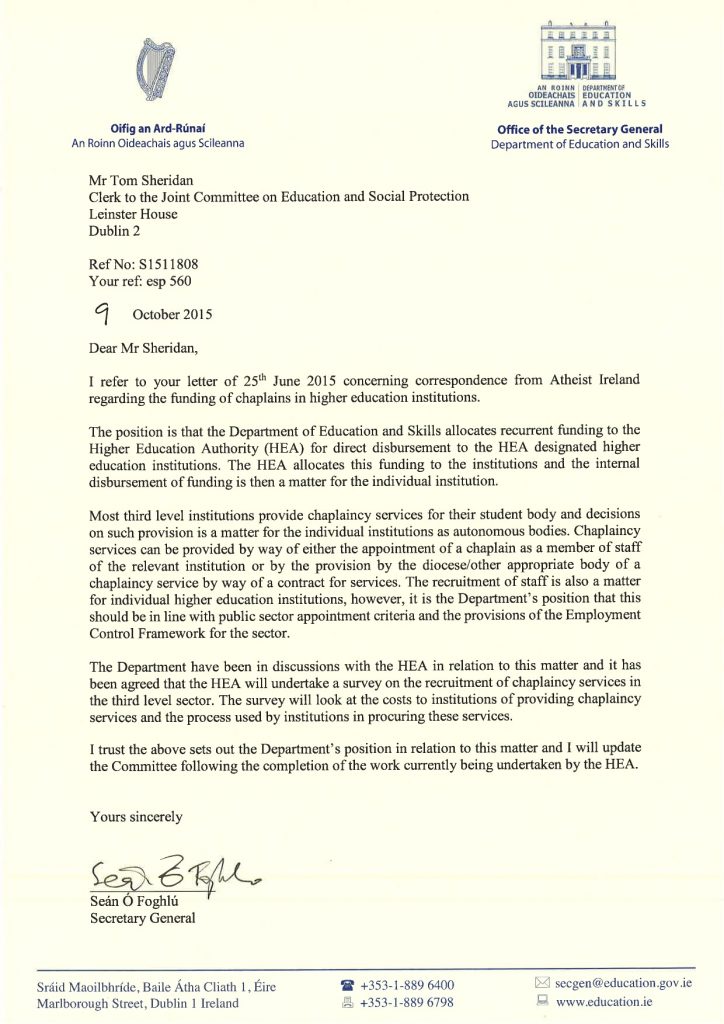
The Letterkenny Institute of Technology was included in this HEA investigation.
June 2016
Following their investigation, the HEA produced an internal report describing the current situation across the third level educational sector, and making a series of recommendations. A copy of the HEA report was procured under the Freedom Of Information Act during June 2016. The content of the report included reference to the HEA meetings with Atheist Ireland, and a full copy of the document is available at the bottom of this page. The HEA asked all third level educational institutions in the country to justify their method of awarding chaplaincy contracts. The extract from the report below depicts the response provided by the Letterkenny Institute of Technology.

The HEA report also recorded €68,000 per annum, as the sum that Letterkenny Institute of Technology was paying from public funds to various churches for chaplaincy services. The institute reiterated their view that contracts should be aware “based on demographics in the region”. Moreover, the contrasting extract from the report below details the conclusions that were reached in terms of what changes were required across the sector.
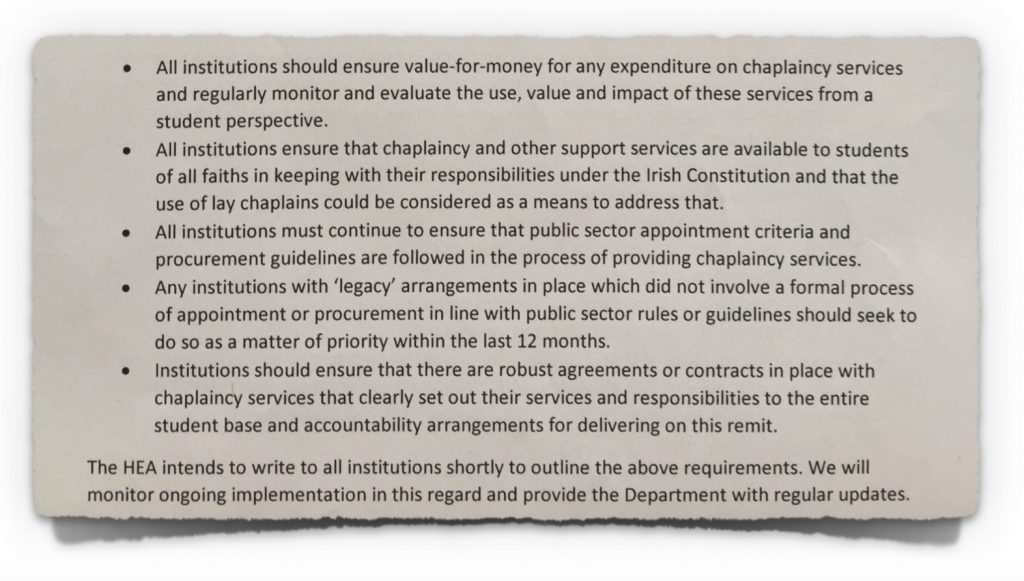
While many institutions changed their appointment process in order to adhere to these recommendations, Letterkenny Institute of Technology did not.
April 2018
The campaign continued, in order to insist on the delinquent institutions reforming their processes for awarding publicly-funded chaplaincy contracts. In April 2018, the HEA conducted a follow-up survey on the same issues. The results of that survey from all third level educational institutions in the country were obtained using the Freedom Of Information Act. The individual response from each institution is available at the bottom of this page. One extract from the response provided by the Letterkenny Institute of Technology is illustrated below.
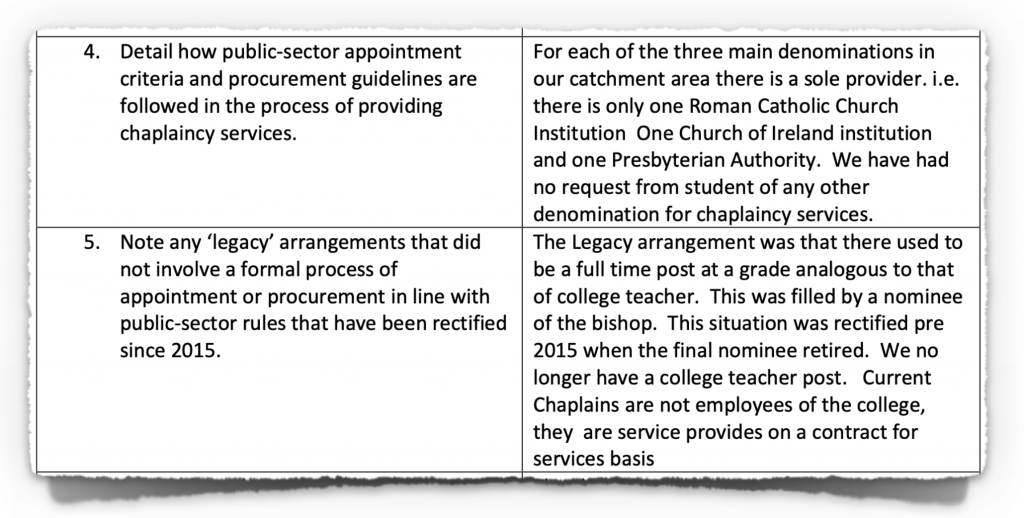
Around three years after the Letterkenny Institute of Technology originally defended their sectarian process of awarding chaplaincy contracts; and around two years after the HEA issued their recommendations for reform; the institute was still doubling down and defending their allocation of publicly-funded contracts by religious headcount.
October 2021
The campaign continued, but the HEA were unwilling to take any more aggressive steps in order to ensure the enforcement of their recommendations. As such, I then wrote to the Committee of Public Accounts about the unconstitutional and discriminatory use of public funds at the Letterkenny Institute of Technology. I received the reply illustrated below.
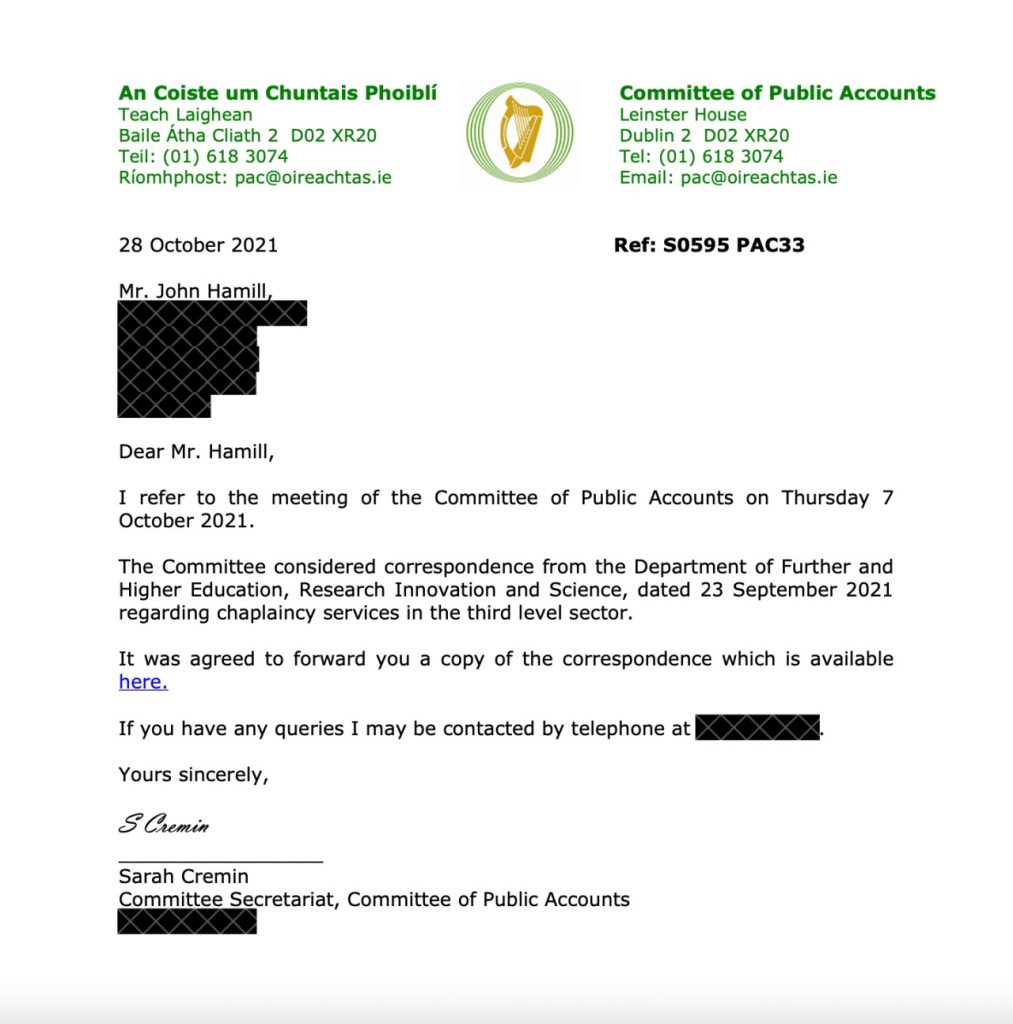
An extract from the letter that the Committee of Public Accounts procured from the Department of Further and Higher Education, is also depicted below. Whereas Letterkenny Institute of Technology had relatively recently defended their chaplaincy appointment process to the HEA, when the Committee of Public Accounts asked about their method of awarding such contracts the institute reported that they had been meaning to reform this procedure for quite some time.
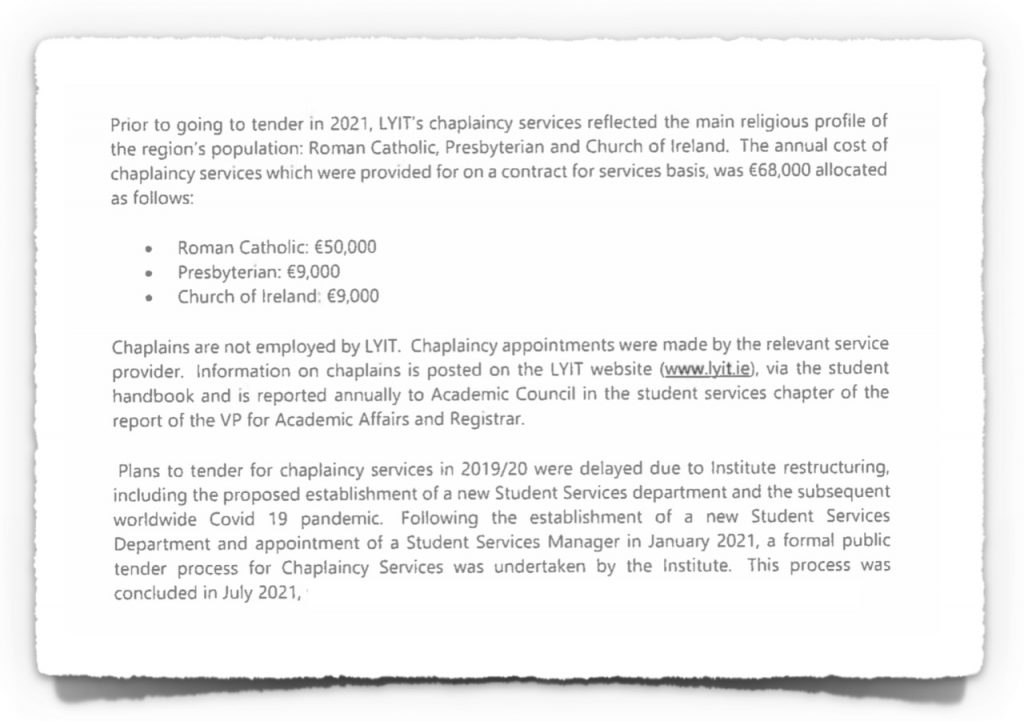
In June 2021, around six years after Letterkenny Institute of Technology had defended their discriminatory process of awarding publicly funded chaplaincy contracts, they eventually replaced that process with an open tender for chaplaincy services. All of the pertinent documents relating to the chaplaincy contracting processes that exist across the entire third level education sector, are provided below. Whereas previously more than €1.5M per annum of public money was handed over to the Roman Catholic Church without advertisement or tender, it will be beneficial to ensure that in future all public appointment guidelines are followed in the appointment of State-funded chaplains.
- 2021 – Chaplaincy Services Tender, Letterkenny Institute of Technology 1
- 2021 – Chaplaincy Services Tender, Letterkenny Institute of Technology 2
- 2018 – Athlone Institute of Technology Chaplaincy Services
- 2018 – Cork Institute of Technology Chaplaincy Services
- 2018 – Dublin City University Chaplaincy Services
- 2018 – Dundalk Institute of Technology Chaplaincy Services
- 2018 – Former Dublin Institute of Technology Chaplaincy Services
- 2018 – Former Institute of Technology Blanchardstown Chaplaincy Services
- 2018 – Former Institute of Technology Tallaght Chaplaincy Services
- 2018 – Galway-Mayo Institute of Technology Chaplaincy Services
- 2018 – Institute of Art, Design and Technology Chaplaincy Services
- 2018 – Institute of Technology Carlow Chaplaincy Services
- 2018 – Institute of Technology Sligo Chaplaincy Services
- 2018 – Institute of Technology Tralee Chaplaincy Services
- 2018 – Letterkenny Institute of Technology Chaplaincy Services
- 2018 – Limerick Institute of Technology Chaplaincy Services
- 2018 – Mary Immaculate College Chaplaincy Services
- 2018 – Maynooth University Chaplaincy Services
- 2018 – National College of Art and Design Chaplaincy Services
- 2018 – National University of Ireland Galway Chaplaincy Services
- 2018 – St Angela’s College Sligo Chaplaincy Services
- 2018 – Trinity College Dublin Chaplaincy Services
- 2018 – University College Cork Chaplaincy Services
- 2018 – University College Dublin Chaplaincy Services
- 2018 – University of Limerick Chaplaincy Services
- 2018 – Waterford Institute of Technology Chaplaincy Services
One response to “University Chaplains”
[…] of Information (FoI) requests than I care to count, which have included those required to address the University Chaplain issue. Anyone who has had more than a passing familiarity with this process, will understand that public […]